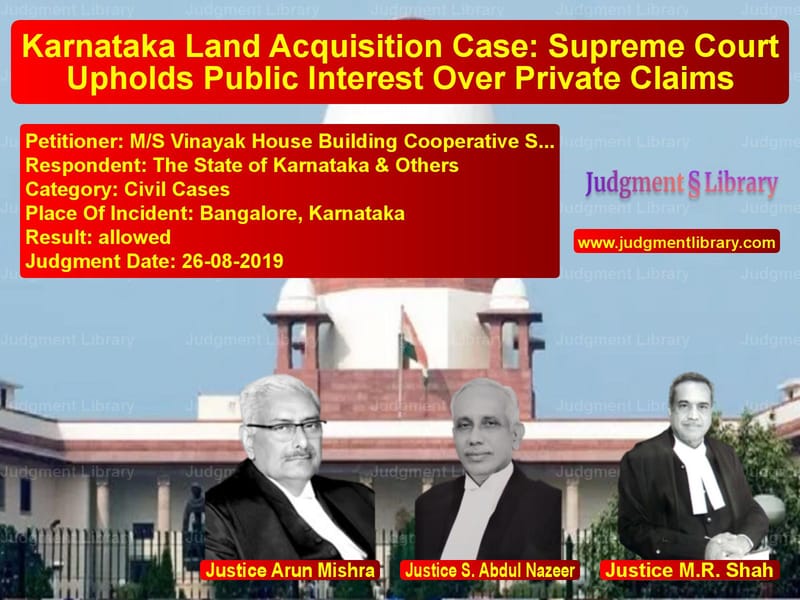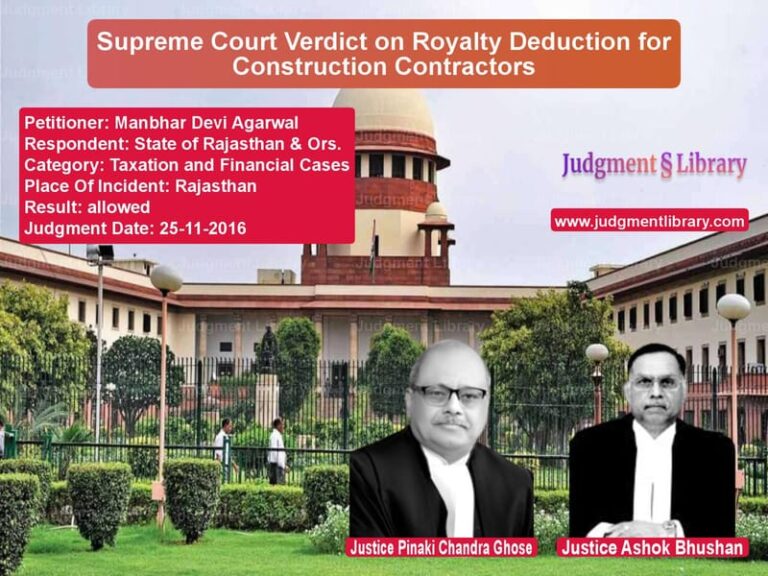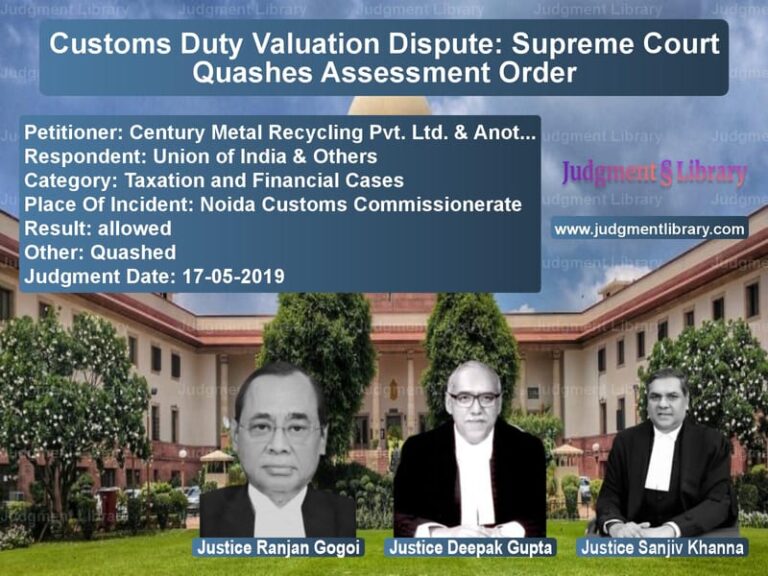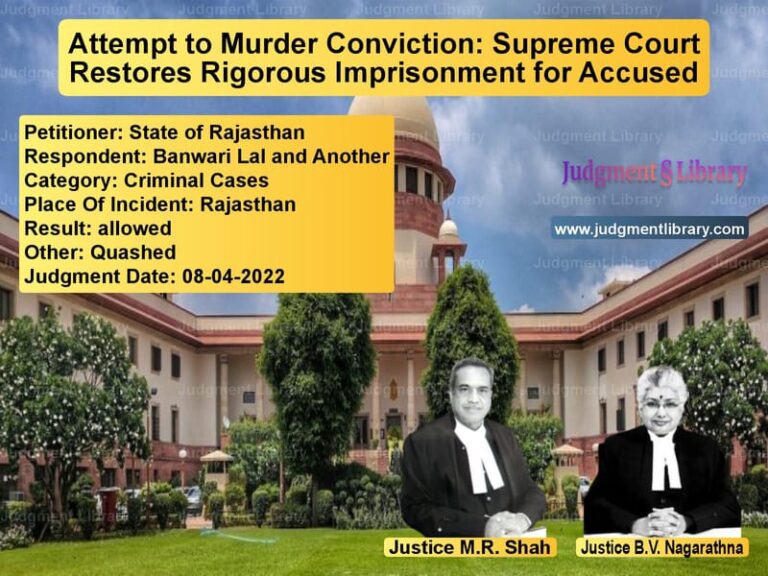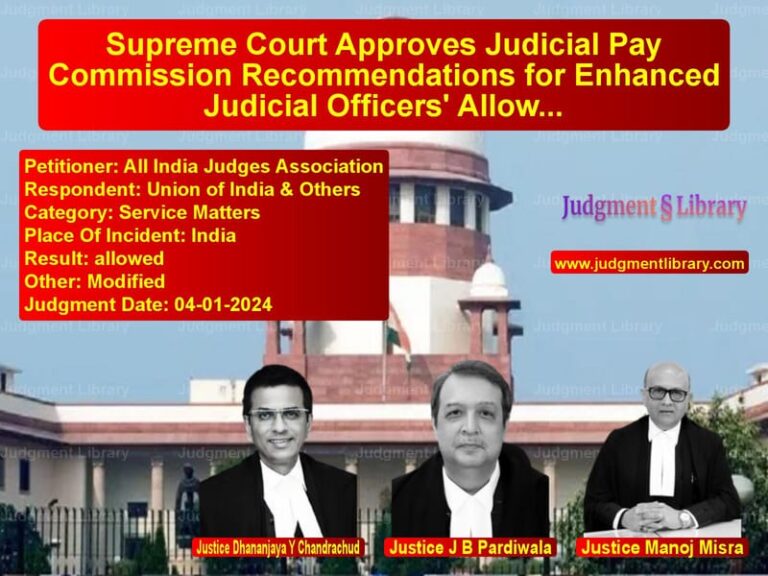Karnataka Land Acquisition Case: Supreme Court Upholds Public Interest Over Private Claims
The case of M/S Vinayak House Building Cooperative Society Ltd. v. The State of Karnataka & Others revolves around a legal battle concerning land acquisition and de-notification in Bangalore. The Supreme Court was tasked with determining whether the Karnataka government’s decision to withdraw certain acquired land was justified and whether such an action disrupted urban planning and public interest.
The Court ultimately ruled in favor of the cooperative society, emphasizing that land acquired for planned development should not be arbitrarily withdrawn, as it impacts civic amenities and structured urban growth.
Background of the Case
The dispute arose when the Karnataka government acquired land in Nagarabhavi Village for the formation of a residential layout by the petitioner, M/S Vinayak House Building Cooperative Society Ltd.. The sequence of events leading to the Supreme Court’s intervention is as follows:
- The cooperative society requested the government to acquire land for residential development.
- The land was acquired under the Land Acquisition Act, 1894, and ownership was transferred to the society.
- One of the respondents, claiming ownership over a portion of the acquired land, challenged the acquisition and sought de-notification.
- The Karnataka government, exercising its power under Section 48(1) of the Land Acquisition Act, issued an order withdrawing the land from acquisition.
- The cooperative society challenged this order before the Karnataka High Court, arguing that it disrupted the planned development.
- The High Court ruled in favor of the respondents, upholding the de-notification.
- Aggrieved by this decision, the cooperative society approached the Supreme Court.
Arguments by the Appellant (M/S Vinayak House Building Cooperative Society Ltd.)
The cooperative society put forth the following arguments:
- The de-notification of land was an arbitrary exercise of power and lacked justification.
- Once land is acquired for a public purpose, it cannot be withdrawn solely based on an individual’s request.
- The layout was approved, and spaces for civic amenities were designated, which would be disrupted by de-notification.
- Urban planning and governance require consistency to ensure orderly development and avoid haphazard construction.
- The High Court erred in upholding the government’s decision without considering the impact on residents and public amenities.
Arguments by the Respondents (State of Karnataka & Others)
The respondents defended the de-notification, stating:
- The acquisition process had procedural flaws, leading to undue hardship for the original landowner.
- Under Section 48(1) of the Land Acquisition Act, the government had the authority to withdraw from acquisition at any stage.
- The land in question did not fully serve the intended public purpose.
- The cooperative society had no vested right in the land until the completion of all legal formalities.
Key Observations by the Supreme Court
The Supreme Court critically analyzed the de-notification process and its implications for urban development. The key observations were:
- Impact on Civic Planning: The Court acknowledged that Bangalore’s urban development was suffering due to unchecked land use changes, leading to environmental degradation and lack of civic amenities.
- Government’s Responsibility: The state cannot indiscriminately withdraw land from acquisition without assessing the consequences on existing and planned urban structures.
- Consistency in Policy: Arbitrary de-notification undermines trust in government planning and creates legal uncertainties.
- Public Interest Prevails Over Individual Claims: The withdrawal of land from acquisition should be examined through the lens of larger public welfare rather than individual convenience.
Supreme Court’s Judgment
The Supreme Court ruled:
“The state government’s power under Section 48(1) of the Land Acquisition Act is not absolute and must be exercised judiciously. The de-notification in this case is quashed, and the acquired land shall remain part of the planned layout.”
The Court directed:
- The disputed land remains part of the planned layout for residential development.
- The state government must prioritize public interest over individual grievances.
- Future land acquisition processes should adhere to strict guidelines to prevent arbitrary reversals.
Implications of the Judgment
The ruling sets a significant precedent for urban planning and land acquisition:
- Ensures Legal Certainty: Land once acquired for public purposes cannot be withdrawn arbitrarily.
- Strengthens Urban Planning: Authorities must adhere to structured development plans and avoid disruption of approved layouts.
- Prevents Misuse of Power: Government decisions on de-notification must be subject to judicial scrutiny.
Conclusion
The Supreme Court’s decision in M/S Vinayak House Building Cooperative Society Ltd. v. The State of Karnataka reinforces the principle that urban planning must be guided by consistency and public welfare. By preventing arbitrary de-notification of land, the ruling safeguards structured development and ensures fairness in land acquisition policies.
This case serves as an important benchmark in land acquisition law, ensuring that government authorities act responsibly while balancing individual rights with broader public interests.
Petitioner Name: M/S Vinayak House Building Cooperative Society Ltd..Respondent Name: The State of Karnataka & Others.Judgment By: Justice Arun Mishra, Justice S. Abdul Nazeer, Justice M.R. Shah.Place Of Incident: Bangalore, Karnataka.Judgment Date: 26-08-2019.
Don’t miss out on the full details! Download the complete judgment in PDF format below and gain valuable insights instantly!
Download Judgment: MS Vinayak House Bu vs The State of Karnata Supreme Court of India Judgment Dated 26-08-2019.pdf
Direct Downlaod Judgment: Direct downlaod this Judgment
See all petitions in Property Disputes
See all petitions in Landlord-Tenant Disputes
See all petitions in Specific Performance
See all petitions in Damages and Compensation
See all petitions in Judgment by Arun Mishra
See all petitions in Judgment by S. Abdul Nazeer
See all petitions in Judgment by Mukeshkumar Rasikbhai Shah
See all petitions in allowed
See all petitions in supreme court of India judgments August 2019
See all petitions in 2019 judgments
See all posts in Civil Cases Category
See all allowed petitions in Civil Cases Category
See all Dismissed petitions in Civil Cases Category
See all partially allowed petitions in Civil Cases Category

